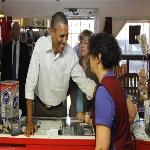28 September 2010

Photo: AP
President Barack Obama, accompanied by New Mexico Lt. Gov. Diane Denish, makes an unscheduled stop at Barelas Coffee House, which serves Mexican food, in Albuquerque, New Mexico, 28 Sep 2010
In 2008, then-Senator Barack Obama won the U.S. presidency in large part because of strong voter turnout from young people, minorities, women and independents. For this year's midterm congressional elections, analysts say that Democrats need to motivate those same groups to get out and vote again to retain their majorities in the House of Representatives and the Senate.
Over the years, Democrats and Republicans have tended to face challenges in congressional midterm elections. Voters typically turn out in smaller numbers than when they go to the polls to elect a president, and that places a priority on making sure that a party's core supporters vote.
This year, by all accounts, Republicans are energized to support their candidates, especially through activists loyal to the grassroots conservative Tea Party movement.
With that in mind, President Obama is spending more time trying to fire up core supporters in his Democratic Party to get out and vote on November 2, especially young people who played an important role in Mr. Obama's election victory two years ago.
The president recently spoke with university journalism students in a conference call from the White House.
"You can't sit it out," said President Obama. "You can't suddenly just check in once every 10 years or so on an exciting presidential election and then not pay attention during big midterm elections, where we have a real big choice between Democrats and Republicans."
Mr. Obama was even more forceful in an interview with Rolling Stone magazine, saying it would be inexcusable and irresponsible for Democrats to sit out the election.
Public opinion surveys suggest that Democrats need to do more to energize their base supporters, especially given that Republicans believe they have enough political momentum to win back control of the House and possibly the Senate.
California Representative Kevin McCarthy was among several Republicans who spoke when they unveiled their governing agenda for Congress known as the "Pledge To America" - a call for lower taxes and cuts in government spending.
"More than 60 percent of Americans believe our country is headed in the wrong path," said McCarthy. "They are right. The pledge is a governing agenda that we will pursue today in order to turn the country around and put us on the right track."
With surveys showing Republicans energized to vote in November, Democratic political strategists are urging the president to take a more active role in ensuring that groups that lean Democratic - like minority voters, younger voters and women voters - show up at the polls on Election Day.
Celinda Lake is a Democratic pollster and political strategist. She says Democrats must rely on President Obama and Vice President Joe Biden to generate enthusiasm during the next several weeks.
"This is a powerful team to go mobilize the Democratic base," said Lake. "I hope that they give the president a one-way [plane] ticket and he doesn't come back [to Washington from campaigning] until the elections because he can have an enormous influence out there, laying out our economic plan and also energizing Democrats. And that is going to be a very, very important part of the equation."
But energizing Democratic voters could be a major challenge this year. The public has a negative view of the economy, and that is reflected in weakening approval ratings for President Obama.
In addition, conservative and libertarian activists under the banner of the Tea Party movement are energized this year, urging voters to make a statement against the president's economic policies and against the Democratic majority in Congress.
John Fortier is a political analyst at the American Enterprise Institute here in Washington.
"In general, I think the atmosphere is greatly improved for Republicans by the Tea Party," said Fortier. "A focus on economics and small government is good for the Republican Party. And the voters who will come out to support their candidates will generally bring them to victory."
Democrats are spending a lot of time trying to motivate younger voters this year because, historically, they have been less likely to vote in congressional midterm elections than older voters.
This year, that could be a serious problem for Democrats, says pollster Celinda Lake.
"Younger voters are the most Democratic voters," said Lake. "Seniors remain the toughest for us. And if there is a story line in this election that is slightly different than the past, it is the animosity of seniors who will show up to vote."
The Tea Party movement is popular with many older voters who are upset about the size of government and who want to cut taxes and government spending.
Both major parties will be spending millions of dollars in the final weeks of this year's election campaign, hoping to persuade their core supporters to go to the polls on November 2.